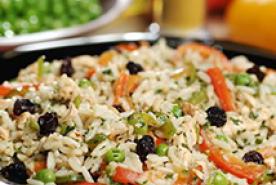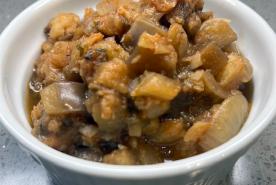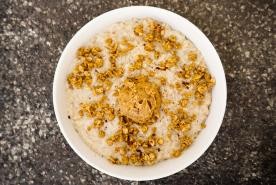Last updated: August 26, 2025
Medically reviewed by: NKF Patient Education Team
Did you know 1 in 10 people will have a kidney stone in their lifetime? Kidney stone rates are rising. Learn the facts and myths to stay stone free.
Table of Contents
- Six easy ways to prevent kidney stones
- One: Don't underestimate Your sweat
- Two: Eat plenty of fruits and vegetables: Oxalate isn’t the enemy
- Three: Do NOT cut out calcium
- Four: It’s not one and done
- Five: When life hands you kidney stones…
- Six: Not all stones are created equal.
- Questions to ask your healthcare professional
Content Created by: Melanie Betz MS, RD, CSR, FNKF, FAND
Six easy ways to prevent kidney stones
Kidney stones are more than just a passing pain—they’re a sign that something in your diet or lifestyle may need to change. Whether you’ve had a stone before or want to avoid one in the future, the steps you take now can make a big difference. From staying hydrated to making smart food choices, here are six simple and science-backed ways to protect your kidneys and reduce your risk of kidney stones.
One: Don't underestimate Your sweat
Saunas, hot yoga and heavy exercise may be good for your health, but they also may lead to kidney stones. Why? Loss of water through sweating - whether due to these activities or just the heat of summer—leads to more concentrated urine and higher risk of kidney stones.
One of the best measures you can take to avoid kidney stones is to drink plenty of water, which will dilute your urine of stone making minerals and make kidney stones less likely. So, be sure to keep well hydrated, especially when engaging in exercise or activities that cause a lot of sweating.
Two: Eat plenty of fruits and vegetables: Oxalate isn’t the enemy
People who eat more plant foods such as fruits, vegetables, whole grains and plant proteins such as beans, nuts and seeds tend to have fewer kidney stones. In fact, both the Mediterranean Diet and Dietary Approaches to Stop Hypertension (or “DASH” diet) can help prevent kidney stones.
Aim for at least 5 servings of fruits and vegetables per day.
A common concern about eating more plant foods is oxalate. Calcium oxalate kidney stones are the most common type of kidney stone. However, a strict low oxalate diet is not usually the best approach to prevent them.
Oxalate is naturally found in many foods, including healthy fruits and vegetables, nuts and seeds, grains and legumes. However, these foods should be limited as these are the exact foods that can help prevent kidney stones because they are packed with calcium oxalate kidney stone inhibitors like potassium, magnesium, phytic acid and fiber.
Rather than focus on strictly limiting how much oxalate you eat, it is much more effective and healthier to be sure to eat enough calcium-rich foods. This will reduce how much oxalate is absorbed from the healthy foods you eat.
Ultimately, the right approach to oxalate depends on your 24-hour urine collection. If you have high urine oxalate despite getting in enough calcium, limiting some very high oxalate foods, such as spinach, Swiss chard, almonds, navy beans, beets and rhubarb may be warranted. Limiting supplements that can increase oxalate such as vitamin C, cinnamon, turmeric and “superfood” supplements can also help. A registered dietitian nutritionist (RDN) with experience in kidney stones can help you balance oxalate while still eating lots of healthy plant foods.
If diet is causing kidney stones, most of the time it is from too much salt, added sugar, meat and not enough water, calcium or fruits and vegetables. It is rare for someone to form kidney stones from eating too many fruits and vegetables.
"People are still telling me that their doctor told them to remove calcium-rich foods from their diet - despite the fact that we’ve known for decades how a low calcium diet can make kidney stones worse,” said Betz.
Don't reduce calcium. Most people with calcium kidney stones should eat 1,000-1,200mg of calcium from food per day. Aim for 2-3 servings of dairy per day to get in enough calcium.
A dairy serving is:
- 1 cup of milk
- 1 ounce of cheese
- ¾ cup yogurt
- 1 cup kefir
Ideally, calcium rich foods should be eaten together, so the calcium is more likely to bind to oxalate and stop it from getting absorbed.
"Most people are very motivated to make diet and lifestyle changes to avoid more kidney stones,” said Betz. "Unfortunately, it seems many people are not given proper advice for effective kidney stone prevention based on their particular urine chemistry or type of kidney stone."
If you want to be sure you are doing everything you can do to prevent kidney stones, make sure to ask your doctor for a 24-hour urine collection. This helps your doctor understand why you are making kidney stones, so they can come up with a personalized stone prevention plan just for you!
Five: When life hands you kidney stones…
And as the saying goes, "make lemonade." Next time you drive past a lemonade stand, consider your kidneys. Lemonade is a common home remedy for kidney stones. But it's important to consider your type of kidney stone and urine risk factors before adding lemonade to your daily regimen.
Uric acid, cystine or calcium oxalate kidney stones are often treated with alkali citrate (an alkaline, or “base”), such as potassium citrate. If urine citrate is low and urine pH levels are too low (or too acidic) medications like potassium citrate can help. Alkali citrate can be prescribed and is available over the counter. Alkali citrate can be given with a mineral(s), such as sodium, potassium or magnesium to help prevent stone formation.
Citrus juices do contain citrate (aka “citric acid”), but large amounts are usually ] needed to make a difference when it comes to kidney stones. Lemon juice (4 fluid ounces per day) mixed with water is usually enough to increase urine citrate and pH.
Also, be careful of sugar. Regular lemonade has quite a bit of sugar and can increase the risk of kidney stones. Sugar-free lemonade is a good option for some people.
Of course, not everyone with kidney stones has low urine citrate or pH. If urine pH is too high, lemon juice or alkali citrate may make this worse. As always, it is important to tailor your kidney stone prevention plan to a 24-hour urine collection.
If you do have low urine citrate, “it is best to work on getting it up by eating plenty of fruits and vegetables and avoiding too much meat”, says Betz. “Medication and/or lemon juice is helpful for some people, but many people are able to get urine citrate level up with diet changes alone.”
Speak with a doctor or other healthcare professional about which treatment options are right for you, including over-the-counter products and home remedies. People with kidney disease may need to watch their intake of sodium, or other minerals, depending on the stage of kidney disease or other factors.
Six: Not all stones are created equal.
Kidney stone prevention is different for every single person. Even the same type of kidney stone can be caused by very different things. It is important to work with your doctor to get a 24-hour urine collection to come up with a personalized prevention plan.
A registered dietitian nutritionist (RDN) with experience in kidney stones can help you understand which diet changes are right for you and help you succeed in making those changes.
Questions to ask your healthcare professional
- Can I get a 24-hour urine test to find out why I’m getting kidney stones?
- What type of kidney stone did I have, and how does that affect my treatment?
- Should I be eating more or less calcium to prevent kidney stones?
- Do I need to avoid foods with oxalate, like spinach or almonds?
- Can I see a dietitian to help me plan meals that prevent kidney stones?


















